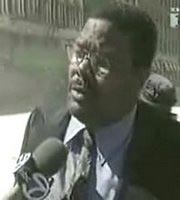
Barry Jennings being interviewed by WABC-TV
News in New York shortly after emerging from WTC 7 the morning
of Sept. 11, 2001
From the April 2009 Idaho Observer:
New information on 9/11 eyewitness Barry Jennings’ death By Jack Blood
|
|
Barry Jennings, a key 9/11 eyewitness who was an emergency coordinator for the New York Housing Authority, passed away last August 2008 at age 53 from undisclosed circumstances. Jennings was an eyewitness to the devastation of the World Trade Center towers on September 11th 2001.
On the morning of 9/11 Barry Jennings with Michael Hess, (one of Rudy Giuliani’s highest ranking appointed officials, New York city’s corporation counsel), entered WTC Building 7.
It was just after the first attack on the North tower, but before the second plane hit the South Tower, when Barry Jennings escorted Michael Hess to the WTC 7. Jennings recalls a large number of police officers in the lobby of WTC 7 when they arrived. The two men went up to the 23rd floor, but could not get in, so they went back to the lobby and the police took them up in the freight elevator for a second try. When they arrived on level 23, at the Office of Emergency Management (FEMA),) they found it had been recently deserted, "coffee that was on the desk, smoke was still coming off the coffee, I saw half eaten sandwiches," he said.
At that point he made some phone calls and an un-named individual told them to "leave, and leave right away." Jennings and Hess then proceeded to the stairs and made it to level 6, when there was an explosion and the stairwell collapsed from under their feet; Jennings was actually hanging and had to climb back up. They made it back up to level 8, where Jennings had a view of the Twin Towers; both buildings were still standing. This is an important detail, as many debunkers have used Jennings’ statements out of context to claim the damage came to WTC 7 from the towers collapsing.
When they made it to the lobby, Jennings found it destroyed and littered with dead bodies. He said it looked like, "King Kong had came through it and stepped on it, [it was] so destroyed, I didn’t know where I was. So destroyed that they had to take me out through a hole in the wall that I believe the fire department made to get me out."
Shortly after he made it out, he was seen on several TV news channels telling his story.
Jennings was admittedly confused as to why Building 7 had to come down at all, and does not accept the official reason that the noises he heard were from a fuel oil tank. "I know what I heard, I heard explosions," Jennings stated.
Jennings testimony was memorialized in Loose Change for the Final Cut version of the extremely popular documentary, but was edited out at the final stage due to Jennings misgivings about losing his job and endangering his family.
The BBC later interviewed Jennings for a "9/11 debunking special" and Jennings seemed to retract the testimony given to Loose Change. Subsequently the creators of the film released the original interview to protect their own credibility.
Jennings passed away shortly thereafter and, coincidentally, just a few days before the long awaited NIST report on WTC 7 was released to the public. It is quite possible that Jennings would have exposed the cover story of NIST, and its explanation that the 47 story-building WTC 7 was the first and only skyscraper felled by fire. He never got that chance.
New Information
On April 15, 2009, I was contacted by Loose Change director and narrator Dylan Avery who said that he had recently begun investigating the death of Barry Jennings and had found some new information relating to his death.
It seems that there is a very good possibility that Jennings’ death could have been due to foul play. Though the investigations are on going, initial findings are somewhat alarming. The conclusion is still forthcoming, but I was shocked by what I heard.
Avery stated he had hired a private investigator to look into Jennings death which remains shrouded in mystery. His motive was simply to bring some closure to the life of Barry Jennings and honor the memory of this brave American. The investigator referred the case to law enforcement and gave Avery his money back with the request that he never contact him again. Avery also paid a visit to the Jennings’ home. He found it vacant and for sale.
Why would a highly paid PI refuse to continue his investigation? Why did he refer the matter to police? He is not talking. What is he afraid of? Was he warned to cease and desist? If so, by whom? These are some of the new questions revolving around the Jennings case.
In every major cover up from the JFK assassination to Iran-Contra, we can see one common thread. The untimely death of eyewitnesses. Barry Jennings was not only an important and most credible eyewitness, but he openly refuted much of the government and media version of events. He was a liability.
Jack Blood is a veteran broadcaster and journalist whose daily updates can be found at www.deadlinelive.info. His April 16, 2009 interview with Dylan Avery can be found at www.wFUradio.com.